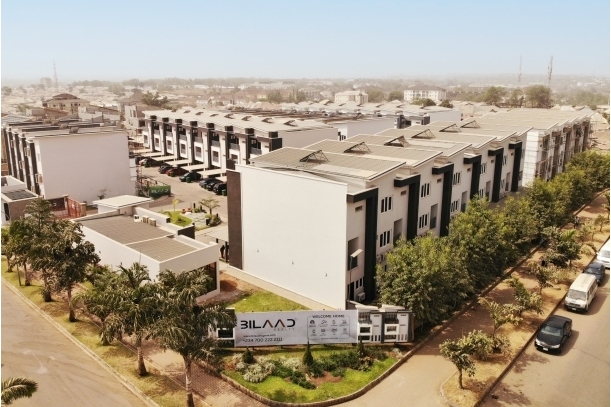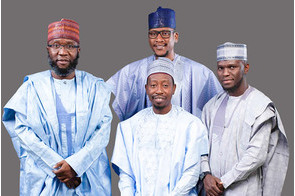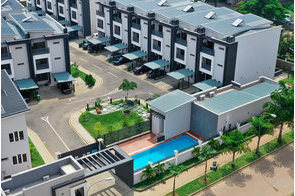Agenda for sustainability in Nigerian real estate sector

Summary
According to a study by Corporate Knights, only three of the 100 most sustainable corporations in the world are real estate companies.
The global real estate industry contributes significantly to the gross domestic product (GDP) of many developing and developed nations. However, residential, commercial and industrial buildings are responsible for 20 per cent of carbon dioxide (CO2) emissions. These buildings are sources of CO2 and other greenhouse gases (GHGs) emissions, due to the huge amount of natural resources they consume and waste they generate. Real estate consumes over 40 per cent of global energy annually; 30 per cent of raw materials and 12 per cent of drinking water. The industry accounts for 25-40 per cent of solid waste.
Real estate, urban development and other human activities constitute an existential threat to biodiversity – which entails the totality of genes, species and ecosystems. The loss of biodiversity, which the world is already experiencing, is one of the drivers of global warming. Experts have called for urgent action to conserve biodiversity by embedding sustainability best practices in human activities as a pathway for achieving sustainable development. Accordingly, real estate developers across the globe need to find solutions for building a sustainable future for the coming generations. The industry must pursue positive long-term societal and environmental goals, in addition to economic goals.
The 17 Sustainable Development Goals (SDGs) of the United Nations represent a coherent and integrated framework for addressing the most urgent global development challenges, including poverty, hunger, income inequality and climate change. Improving the sustainability and affordability of housing and urban living has direct impact on almost all the SDGs.
According to a 2016 report by the World Economic Forum, emissions caused by buildings and new construction are expected to grow. The projected global population growth is expected to create a demand of 260 million new residential properties and 540 million square metres of office space in the largest 750 cities by 2030 based on the Oxford Economics’ Global Cities 2030 report, which shows Lagos will become Africa's largest city in GDP terms, while ranking 114th globally.
In developing countries like Nigeria, adoption of sustainable eco-friendly substitutes in terms of raw materials for real estate development requires significant motivation and possibly an organized platform to foster discussions on the subject-matter. Innovation spawned from research and development is also an essential component of sustainability in the real estate industry.
For almost eight years, ESMT Berlin – a private non-profit business school based in the German city – has been facilitating the Sustainable Business Roundtable or SBRT. Adidas, ING, Siemens, Unilever, and other international member-companies have created a viable corporate agenda for sustainability. In contrast to these companies, businesses in the real estate sector have been relatively slow to adopt new and sustainable ways of operating. In fact, according to research published in 2017 by Corporate Knights, only three of the 100 most sustainable corporations in the world are real estate companies.
What is holding the real estate companies back, and how can we change the situation in Nigeria?
Anticipate stakeholder needs
In the real estate industry, learning from stakeholders creates excellent opportunities for innovation. Anecdotal evidence from the collaborative ESMT-ZIEGERT research project indicates that real estate clients are very interested in sustainability solutions. For example, many of them use sustainable paints in their apartments. Others provide sustainable retail spaces for supermarkets.
Cultural dynamics must play a key role in assessing the opportunities for positive social and environmental impact in the real estate sector. Lessons can be drawn in this regard from global practices. In 2018, for example, the German global food discounter, Aldi, announced its plans to build affordable housing atop its supermarkets, starting with the ones in Berlin.
Offering developments for better and sustainable living/working in cities is on the agenda of many municipalities. Indeed, real estate companies have an excellent opportunity to drive sustainability topics like smart cities or e-mobility. This will require collaboration with players as diverse as retailers, car manufacturers and mobile broadband providers (some of which have commenced already in Nigeria). If done well, such initiatives have the potential to shape sustainable consumption and drive the development of sustainable cities.
Generate shared value
The gamut of real estate stakeholders is broad, but it encompasses manufacturers of fittings and fixtures, building materials, architects, financiers and ultimately the customers or end-users. Imbibing the ethos of shared values means real estate firms can create a situation where they focus exclusively on generating long-term value for their stakeholders, while being environmentally and socially responsible corporate citizens. This is contrary to the so-called tragedy of the commons – whereby economic actors collaborate in their mutual selfish interest.
Company employees can also play a valuable role in the process. To do this, they need to be aware of what the issues are and have a say as to what can be done. If this approach were to be adopted by institutions in both the public and private sectors, the long-term benefits would be phenomenal.
Collaborate
No single player in the real estate sector can have a considerable positive impact without collaboration. Businesses and other stakeholders must cooperate to solve complex problems.
The current state of affairs where there is very limited collaboration needs to change. Collaboration among players is necessary to attain significant reduction in pollution and environmental degradation. Evidence is growing that green buildings provide some of the most effective means to achieving a range of global development goals, including climate change mitigating, economic growth as well as renewal and planning of cities and other human settlements.
Green residential projects are not a fanciful trend anymore. They are rapidly becoming the new standard for healthy and responsible living. Green projects bring with them aspects like sustainable design, scientific construction and energy-efficient operations.
It must be acknowledged that the concept of green building is still at infancy in Nigeria. Some of the benefits of such projects include, but not limited to, better air quality; enhanced daylight use in buildings, leading to lower electricity consumption; superior health and overall wellbeing; improved conservation of water; and incorporation of recreational and green spaces in communal developments.
As with all businesses, knowledge is the key to making the right choices and ensuring that one’s decision results in the anticipated outcome – both in terms of investment value and in lifestyle benefits. Recognising the growing need for sustainable living in Nigeria, Bilaad Realty Limited undertakes continuous improvement and research in developing sustainable communities that nestle comfortably amidst serene landscapes, with green elements incorporated seamlessly into the designs to offer a holistic sustainable living experience.
Bilaad Realty Limited is an Abuja-based company focused on delivering sustainable real estate solutions.
Related
-
Bilaad Realty: Driving value through sustainABLE cities
Bilaad aims to help interpret the SDGs into practical everyday living for our clients.
-
Sustainability recommendations for 2022
It is important that we charge forward boldly in the new year and remain resilient to challenges, as we pursue a ...
-
Sustainable construction: what, why and how
More sustainable construction is the desire of every stakeholder, from the government to procurement bodies and the ...









